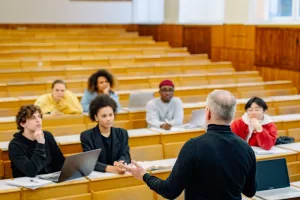My thirteen-year-old sister sends me TikToks daily. I usually love it, as I know that this is the way she thinks of me, when she, like almost every other teenager of that generation, spends her daily time in front of the screen.
Looking at the hard facts, despite the 13+age limit, not only teenagers but children aged 4-15 spend an average of 75 minutes on for example TikTok per day, wherefore it can be considered as the first source of news for young people. So recently, the TikToks my sister sends me started to get a lot more violent and aggressive, as they were videos of people in situations of war, mostly the wars happening in Ukraine and the Middle East right now.
On the one hand, I think it is very important that she is actively informing herself about what is going on in the world right now, as brutal and heartbreaking as it might be. On the other hand, though, many videos that she sent me were not only extremely intense but also exceedingly emotional for a 13-year-old to handle. We all are aware that war is about people who are dying, families that get torn apart, and children, the same age as my sister, getting traumatized for life. But why is it problematic that young minds get such easy access to this horrible side of humanity in 30-second videos?
TikTok is a business, so its main goal is to keep its users interested, to keep them on the app and watching its videos. And how does TikTok do that? By triggering the feelings of young children and adults, by stressing them, and making them anxious. Because stress and anxiety create addiction. The more brutal and emotional the video, the more efficient for the app.
Of course, emotion in general is good, it is human. We all feel emotional about certain topics, and we should do so. But sometimes emotion can get in the way of understanding a situation rationally, especially when this situation is happening all at once, and your brain is not yet fully developed, like in the case of children and young adults.

I cannot imagine how deeply emotionally hurt humans in situations of war must feel. Therefore, I admire completely that these human beings will portray their point of view as directly as they can for young minds like my sister to get a straightforward source of information. So of course, social media can help to foster a sense of global solidarity and community in young adults, as it encourages humans from all over the world to engage in discussions about peace and conflict resolution. Together.
But, disinformation or a lack of objectivity, due to emotion, which is more than understandable when dealing with the immediate consequences of war, can rifle factually wrong propaganda and lead to even more violence, especially between young people as it pushes our emotional buttons. The graphic and often disturbing content, like that shown on TikTok for the eyes of any young child worldwide, can be further traumatizing and even lead to desensitization after being overexposed to violent content.
The impact that the digital public sphere has on young people when dealing with imagery about wars and violent conflicts, is extreme. As important as it is for young minds to develop critical thinking skills, I believe that TikTok is the wrong approach to educate, as it is more hurting than helping to inform truthfully and rationally enough. The case is actually that we see more and more teenagers using violence instead of preaching peace to show solidarity or support with certain sides of the war.
I have witnessed, looking at my own sister, that in the end, the digital public sphere does more harm to children’s mental health and education than good. No side benefits from this source of information, as at last, many young minds then decide not to get informed at all to protect their own well-being.
But as education is the key to creating a peaceful global community, we desperately need to invest in useful, controlled education that helps to build a mentally healthy yet strongly educated new generation. Only then will we have a chance of a peaceful future. Together.
Featured image: Genomind







